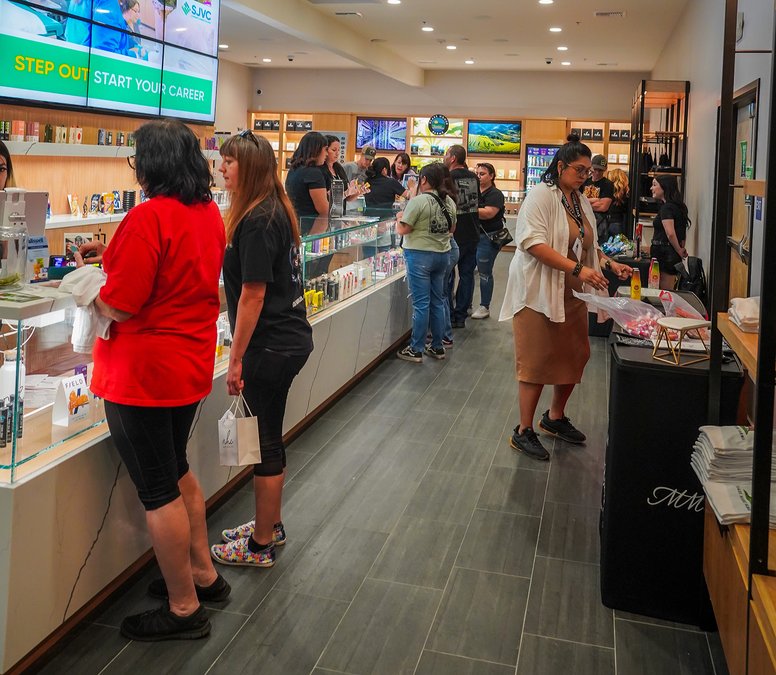Turlock’s ad hoc cannabis committee met on Thursday to discuss the future of the city’s cannabis pilot program, and gauging by the tone of their discussions, it’s likely that the program is here to stay.
The committee heard a presentation from Ajay Kolluri and Mark Lovelace of HdL Companies — a municipal finance consulting firm based in Brea — and then mulled seven questions left for them by the HdL report.
Committee member Jim Reape, who serves on the city’s planning commission, started off by saying, “I see no reason to sunset this program.”
Matt Davis, also a member of the planning commission, agreed with Reape, but said improvements were needed to make it a better program.
District 1 city councilmember Kevin Bixel replied, “I can give you 3.5 million reasons to make this a better program.”
Since four retail cannabis licenses were green-lit in May 2019, three business have opened their doors in the city — Firehouse Cannabis Dispensary, Perfect Union Weed Dispensary and National Healing Center. The fourth, Evergreen Market, is expected to open later this year.
To date, the dispensaries have combined to generate more than $3.5 million in revenue for the city.
As it’s currently structured, the program requires dispensaries to pay the city 5.25 percent of their gross receipts or a $25,000 monthly fee (which increases to $35,000 after one year and then $45,000 after four years).
The city garnered $1,156,315 in fiscal year 2020-21, and saw a modest increase to $1,254,381 the following year. For 2022-23, the city has received $1,183,340 (the report was prepared with just a handful of days remaining in the fiscal year).
Most of that $3,594,036 was accumulated with just two dispensaries in operation. NHC opened its doors in May, more than 10 months into the fiscal year.
In addition to four retail licenses, the city allows for cultivation, manufacturing, distribution and testing. There are no limits on these business types, though all businesses are required to enter in a five-year development agreement with the city, and all businesses must obtain a conditional-use permit.
For the most part, public comments were positive, though there was some consternation as to where the dispensaries are located.
“I want to make this very clear, I’m speaking as a voter, as a citizen, not as a school board member,” said Mary Jackson, who once held a seat on the city council. “I’m not against dispensaries, but I want them in industrial areas. I say that every time I speak.”
Jackson went on to say that the requirement that dispensaries be located at least 600 feet from schools and parks is not enough. She’d like to see that distance increased.
Chelsea Haskins, director of state and local licensing for Perfect Union, spoke out against the potential elimination of the pilot program.
Angelica Sanchez, director of government affairs and compliance for Perfect Union, addressed concerns about the development agreement and the need to rework the public benefit payment.
Attorney Mike Warda, who represents Firehouse and cultivator Flavor Farms, said the program is working.
“What are the problems you’re trying to fix?” Warda said. “You have revenue, you have no police problems and you’ve got no community complaints. I can tell you that from our perspective, you’ve got 14,000 customers in the city of Turlock that are participating, that are customers. Again, I’m not quite sure what the issue is.”
Evergreen Market representative Byron Bogaard also addressed the committee, making the case for continuation of the program.
Darron Silva of Cali Kosher, a vertically integrated cannabis company headquartered at 600 D St., Turlock, believes the program should not only be continued, but expanded.
“I don’t understand why there’s not delivery allowed, especially for the companies already doing retail,” said Silva. “Everybody else gets to deliver. Coffee. Food. GrubHub, you’ve got all these others delivering whatever it is they want to deliver. So, I think you guys should really think about having the non-storefront delivery retails activated. We have delivery in Oakdale, delivery in Modesto, delivery in Patterson. And, by God, we deliver to Turlock because there’s no delivery in Turlock.”
Committee chair Cassandra Abram, the city’s councilmember from District 3, said that another meeting will be held at a date to be determined as the committee strives to gather facts and public input.
“It’s really helpful and valuable to hear from our operators,” said Abram. “And the points are well taken about the need to really understand what’s happening locally as we’re making these decisions. It’s really my intention for this process to be transparent and well thought out.”









